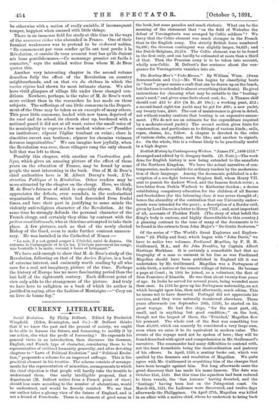CURRENT LITERATURE.
Social Evolution. By Philip Delbert. Edited by Frederick Wingfield. (Eden, Remington, and Co.)—M. Delbert thinks that if we know the past and the present of society, we ought to be able to foresee the future, and foreseeing, to modify it by our action, else what the profit of foreseeing ? He expounds his general views in an introduction, then discusses the German, English, and French type of character, considering these to be representative of civilised humanity generally, and after devoting chapters to "Laws of Political Evolution" and "Political Evolu- tion," propounds a scheme for an improved suffrage. This is the practical element in his treatise. The scheme consists of arrange- ments for the representation of minorities, arrangements to which the chief objection is that people will hardly take the trouble to understand them. One easily intelligible proposal, that a department (M. Delbert writes from a French point of view) should lose seats according to the number of abstentions, would be understood, and would be fiercely resisted. We see that our author takes a gloomy view of the future of England, and is not a friend of Free-trade. There is an element of good sense in
the book, but some paradox and much rhetoric. What can he the meaning of the statement that "on the field of Waterloo the defeat of Vercingetorix was avenged by Celtic soldiers " ? We fancy that the Celtic element was much stronger in the French than in the English army. The strictly British force numbered 34,486; the German contingent was slightly larger, 34,623; and the Dutch-Belgians, 29,214. The Celtic element was to be found in the first only, and can hardly be estimated at more than a third of that. Then the Prussian army is to be taken into account, wholly non-Celtic. M. Delbert's fine sentence about the ven- geance for Vercingetorix vanishes into air.


































 Previous page
Previous page